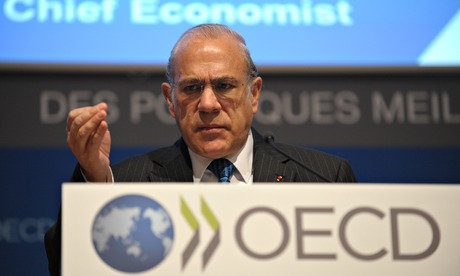Revealed: how the wealth gap holds back economic growth
OECD report rejects trickle-down economics, noting ‘sizeable and statistically negative impact’ of income inequality

The west’s leading economic thinktank on Tuesday dismissed the concept of trickle-down economics as it found that the UK economy would have been more than 20% bigger had the gap between rich and poor not widened since the 1980s.
Publishing its first clear evidence of the strong link between inequality and growth, the Paris-based Organisation for Economic Cooperation and Development proposed higher taxes on the rich and policies aimed at improving the lot of the bottom 40% of the population, identified by Ed Miliband as the “squeezed middle”.
Trickle-down economics was a central policy for Margaret Thatcher and Ronald Reagan in the 1980s, with the Conservatives in the UK and the Republicans in the US confident that all groups would benefit from policies designed to weaken trade unions and encourage wealth creation.
The OECD said that the richest 10% of the population now earned 9.5 times the income of the poorest 10%, up from seven times in the 1980s. However, the result had been slower, not faster, growth.
It concluded that “income inequality has a sizeable and statistically negative impact on growth, and that redistributive policies achieving greater equality in disposable income has no adverse growth consequences.
“Moreover, it [the data collected from the thinktank’s 34 rich country members] suggests it is inequality at the bottom of the distribution that hampers growth.”
According to the OECD, rising inequality in the two decades after 1985 shaved nine percentage points off UK growth between 1990 and 2000. The economy expanded by 40% during the 1990s and 2000s but would have grown by almost 50% had inequality not risen. Reducing income inequality in Britain to the level of France would increase growth by nearly 0.3 percentage points over a 25-year period, with a cumulated gain in GDP at the end of the period in excess of 7%.
“These findings have relevant implications for policymakers concerned about slow growth and rising inequality,” the paper said.
“On the one hand it points to the importance of carefully assessing the potential consequences of pro-growth policies on inequality: focusing exclusively on growth and assuming that its benefits will automatically trickle down to the different segments of the population may undermine growth in the long run, in as much as inequality actually increases.
“On the other hand, it indicates that policies that help limiting or – ideally – reversing the long-run rise in inequality would not only make societies less unfair, but also richer.”
Rising inequality is estimated to have knocked more than 10 percentage points off growth in Mexico and New Zealand, nearly nine points in the UK, Finland and Norway, and between six and seven points in the United States, Italy and Sweden.
The thinktank said governments should consider rejigging tax systems to make sure wealthier individuals pay their fair share. It suggested higher top rates of income tax, scrapping tax breaks that tend to benefit higher earners and reassessing the role of all forms of taxes on property and wealth.
However, the OECD said, its research showed “it is even more important to focus on inequality at the bottom of the income distribution. Government transfers have an important role to play in guaranteeing that low-income households do not fall further back in the income distribution”.
The authors said: “It is not just poverty (ie the incomes of the lowest 10% of the population) that inhibits growth … policymakers need to be concerned about the bottom 40% more generally – including the vulnerable lower-middle classes at risk of failing to benefit from the recovery and future growth. Anti-poverty programmes will not be enough.”
Angel Gurría, the OECD’s secretary general, said: “This compelling evidence proves that addressing high and growing inequality is critical to promote strong and sustained growth and needs to be at the centre of the policy debate. Countries that promote equal opportunity for all from an early age are those that will grow and prosper.”